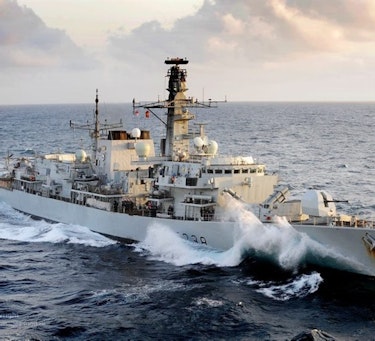NATO & Maritime Asia

Royal Navy frigate HMS Northumberland.
Foto: Defence Images (Flickr CC BY)In this week's analysis, Associate Professor at the Norwegian Institute for Defence Studies, Ian Bowers, writes about how NATO nations and their navies should combine operations and concentrate their limited resources in the waters of Europe. Enjoy the reading!
In February 2018, the British Minister for Defence announced that the Royal Navy would sail a frigate through the South China Sea, ‘making it clear that our Navy has the right to do that’. This follows France’s increasing security engagement in the region. The deployment comes at a time when the liberal order is under pressure across the world. China’s growing presence not only in Asia but also in Africa and Europe, in combination with its coercive activities in the South China Sea and beyond present a substantial strategic dilemma. Equally creating a joint and coherent response to Russia’s increasing levels of activity in the sea and airspace of Northern Europe, the Baltics and the Middle East is proving to be a complex task. Added to these strategic challenges are uncertainties surrounding the Trump administration and its calls for greater burden sharing. This requires naval planners in NATO capitals across Europe to ask hard questions regarding their role in maintaining the liberal international order with increasingly slim resources.
The Royal Navy’s deployment is most likely designed to demonstrate the UK’s continued commitment to the law of the sea and to signal to Asian and Pacific security partners that it is capable of engaging in global security issues. However, one must ask if this is an effective use of limited resources. The dispatch of a single frigate on one deployment through international waters in Asia is unlikely to achieve any strategic effect. There is no indication of a consistent NATO or European approach to the Asia-Pacific and without one piecemeal deployments will have little short or long-term benefit.
NATO’s navies will have much greater global strategic influence by initially concentrating their limited resources in the waters of Europe. Sustained and combined operations in the seas of both Northern and Southern Europe would not only signal to the US that Europe is willing to meet their obligations in their own waters, but also provide an effective defence of the liberal order in the region.
This does not mean that NATO should ignore Asia. Heightened capacity building programs in the South China Sea and Indian Ocean combined with consistent diplomatic efforts to support freedom of navigation would be a good first step. A sustained and unified approach to operations at sea in Europe would lead to a more effective and efficient use of NATO naval resources. In the future, these efficiencies could free-up platforms for consistent and therefore meaningful deployments through contested waters in Asia. For NATO nations and their navies to have a true global impact, they need to address their issues at home first.
Further Reading:
Øystein Tunsjø (2018): China’s Rise and Strategic Adjustments in Asia and Europe
John Andreas Olsen (2017): Introduction: The Quest for Maritime Supremacy
Brendan Nicholson (2017): Real Clear Defense: France’s Increasing Naval Presence in the Asia-Pacific: ‘We Live in the Region’
Vice Admiral James Foggo & Alarik Fritz (2016): The Fourth Battle of the Atlantic
Ian Bowers is an Associate Professor at the Norwegian Institute for Defence Studies.